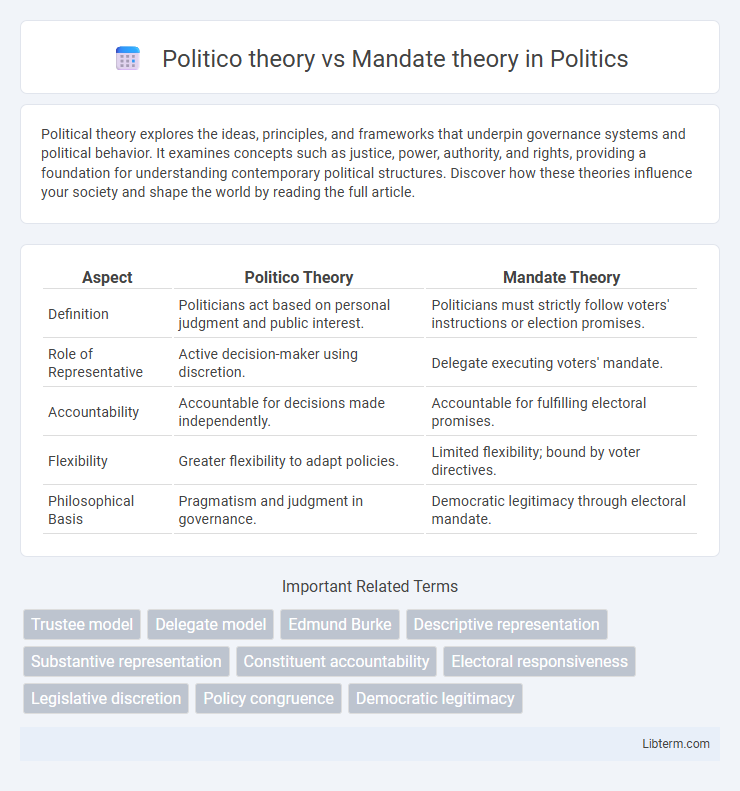Political theory explores the ideas, principles, and frameworks that underpin governance systems and political behavior. It examines concepts such as justice, power, authority, and rights, providing a foundation for understanding contemporary political structures. Discover how these theories influence your society and shape the world by reading the full article.
Table of Comparison
| Aspect | Politico Theory | Mandate Theory |
|---|---|---|
| Definition | Politicians act based on personal judgment and public interest. | Politicians must strictly follow voters' instructions or election promises. |
| Role of Representative | Active decision-maker using discretion. | Delegate executing voters' mandate. |
| Accountability | Accountable for decisions made independently. | Accountable for fulfilling electoral promises. |
| Flexibility | Greater flexibility to adapt policies. | Limited flexibility; bound by voter directives. |
| Philosophical Basis | Pragmatism and judgment in governance. | Democratic legitimacy through electoral mandate. |
Introduction to Politico and Mandate Theories
Politico theory describes political representatives as flexible actors who alternate between trustee and delegate roles depending on the issue and public opinion, blending personal judgment with constituent preferences. Mandate theory asserts that elected officials must strictly follow the policy platform on which they were elected, viewing their mandate as a binding directive from voters. Understanding these foundational theories highlights contrasting views on political accountability and decision-making in representative democracy.
Defining the Politico Theory
The Politico Theory of representation describes elected officials who alternate between acting as delegates and trustees, adjusting their decisions based on the issue's importance and public opinion. This theory contrasts with the Mandate Theory, where representatives strictly follow the explicit instructions of their voters without personal judgment. Politico representatives balance personal discretion with constituents' demands to maximize effective governance.
Understanding the Mandate Theory
The Mandate Theory asserts that elected officials have a direct obligation to implement the policies and promises presented during their campaigns, reflecting the explicit will of the electorate. This theory emphasizes the representative mandate as the guiding principle for governance, contrasting with the Politico Theory, where officials balance personal judgment and constituent interests. Understanding the Mandate Theory highlights the expectation that political leaders act as agents executing the specific agenda endorsed by voters.
Historical Origins of Both Theories
The Politico theory originated from the evolution of political representation in 19th-century British and American parliamentary systems, emphasizing a balanced role between delegate and trustee models in legislative decision-making. The Mandate theory emerged during the Progressive Era as reformers insisted that elected officials must adhere strictly to the explicit policy platforms endorsed by voters during elections. Rooted in differing interpretations of democratic accountability, the Politico theory reflects flexible political judgment, while the Mandate theory underscores electoral promises as binding mandates from constituents.
Key Differences Between Politico and Mandate Theories
Politico theory emphasizes a flexible approach where representatives balance their own judgment with constituents' preferences, allowing adaptive decision-making. Mandate theory insists representatives must strictly follow the explicit instructions of their voters, acting as direct agents without personal discretion. The key difference lies in the degree of autonomy permitted: Politico theory advocates a hybrid role, while Mandate theory demands adherence to voter mandates.
Practical Applications in Modern Politics
Politico theory advocates that elected representatives balance personal judgment with constituents' preferences, enabling flexible decision-making in legislative processes and coalition-building. Mandate theory asserts that officials must strictly follow campaign promises, reinforcing accountability but potentially limiting adaptability to new information during governance. In modern politics, the Politico approach facilitates pragmatic policy adjustments, while Mandate theory emphasizes electoral legitimacy and voter trust, shaping how politicians navigate complex political agendas.
Advantages of the Politico Theory
The Politico theory offers flexibility by enabling elected officials to balance delegate representation with trustee judgment, adapting decisions based on public opinion and situational demands. This approach enhances responsiveness to constituents while allowing lawmakers to exercise expertise and discretion in complex policy issues. It fosters pragmatic governance that aligns political accountability with effective decision-making.
Strengths of the Mandate Theory
The Mandate theory's strength lies in its clear democratic legitimacy, as it emphasizes elected leaders' obligation to implement the policies promised during their campaigns, ensuring accountability to voters. This theory fosters a direct link between electoral promises and governance, enhancing transparency and trust in political representatives. It also encourages consistent policy implementation, reducing uncertainty and promoting effective leadership.
Criticisms and Limitations of Each Theory
Politico theory faces criticism for oversimplifying political behavior by assuming leaders often balance mandates with their judgment, which can undermine democratic accountability and voter influence. Mandate theory is limited by its unrealistic expectation that representatives must strictly follow electoral promises, ignoring the complexities and evolving contexts of governance. Both theories struggle with practical application, as politico theory may erode trust in political consistency, while mandate theory can constrain necessary policy adaptation and responsiveness.
Comparative Analysis: Which Theory Prevails Today?
Mandate theory asserts that elected officials must implement the policies they campaigned on, emphasizing a direct voter-authority link, while politico theory views politicians as pragmatic agents who balance public opinion with political realities. Contemporary governance increasingly favors politico theory, as the complexity of modern policy issues and divided electorates require adaptive decision-making beyond strict campaign promises. Empirical studies of legislative behavior reveal a predominant reliance on politico strategies, highlighting the need for flexible representation in dynamic political environments.
Politico theory Infographic

 libterm.com
libterm.com